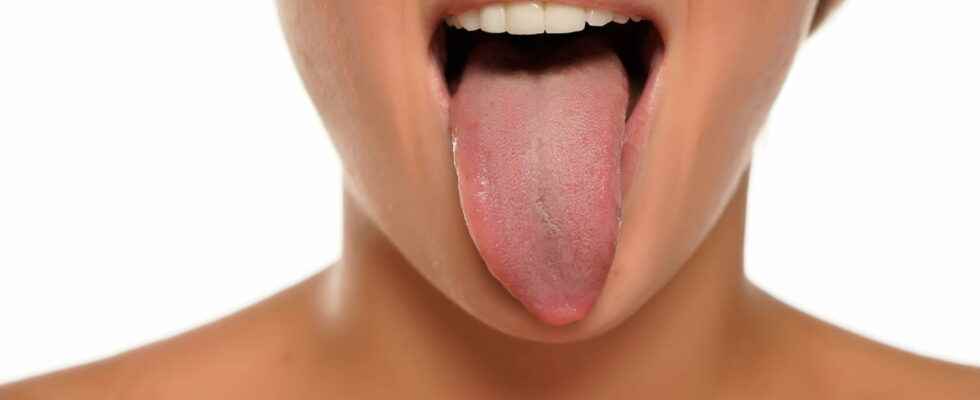Oral cancer affects the oral mucous membranes. The symptoms vary depending on the location of the tumour: lesions, white coating in the mouth, lymph nodes… Here are the signs that should alert.
Oral cancer is one of the most preventable cancers. He is one of the cancers of the upper aerodigestive tract (lip, mouth and pharynx). Nearly 10,000 new cases are discovered each year and 3000 deaths are identified (for these three types of cancer) according to the latest publications of the inca. Early detection and monitoring of certain signs on the tongue, palate, different mucous membranes can identify the disease and greatly increase the chances of recovery. How does oral cancer start? What are the first symptoms? The signs of an advanced stage ? When and who to consult? Tower of signs not to be overlooked and advice from Dr Edmond Binhas, dental surgeon and president of the Dentéon Santé group.
Oral cancer is a condition that affects the oral mucous membranes. Symptoms of oral cavity cancers vary depending on the location of the tumor. Signs of mouth cancer can be seen on:
- language
- the gingiva (posterior, anterior)
- the palate (hard or soft)
- the floor of the mouth (part below the tongue)
- the inner sides of the cheeks and lips
- tonsils.
“A coating whitish (leukoplakia) or reddish (erythroplakia) in the mouth (on the lips, tongue, inside of the cheek, gums or floor of the mouth) that persists is a warning sign. Most of the time, it is a precancerous stage but it does not necessarily degenerate into oral cancer“, explains our interlocutor. Depending on the diagnosis of the doctor, a treatment may be necessary to remove this coating.
>> Difference between plaster and plaque: “dental plaque can be removed by scraping it off, on the other hand, a coating at the pre-cancer or cancer stage does not disappear without appropriate treatment“, observes the specialist.
“Of the sores, lesions, or ulcers in the mouth or on the lip who do not heal after 2 weeks must push to consult. It can be a problem of canker sores or gingivitis, but sometimes it is also a sign of cancer of the oral cavity.“, points out Dr. Binhas.
“The appearance or development of swollen glands in the neck or mandible (lower jaw bone) should be monitored as this is always a sign of inflammation or infection. Lymph nodes are more or less large balls at the level of the neck or under the jaw. Attention, it can be a beginning of abscess or a growth of wisdom tooth in which case it is not very serious. But it can also be the sign of the beginning of carcinoma. As a precaution, it is better to consult a doctor”warns our interlocutor.
“Bleeding associated with presence of red patches in soft tissue may be suggestive of the onset of oral cancer. If it becomes recurring, it is not trivial. However, bleeding from the mouth is not always cancer. In other words, it is not because one bleeds from the mouth that one has cancer.“, wishes to reassure the specialist.
“Pain is not a systematic sign of oral cancer. But continual pain when swallowing (swallowing) or when chewing that lasts more than 15 days must lead to a consultation with the general practitioner who, if he has the slightest doubt, will carry out additional examinations or refer the patient to a specialist in the orofacial sphere (ENT doctor, stomatologist, maxillofacial surgeon, etc.)“, says Dr. Binhas.
List of aggravating factors for oral cancer
|
“A sudden and persistent loss of appetite and sudden and unexplained weight loss, may be suggestive of oral cancer, especially if associated with mouth sores“, details the dental surgeon. Nevertheless, weight loss is not systematic in the case of oral cancer.
“Teeth that move a localized area (two or three teeth but not the whole jaw because in this second time, it would rather be a periodontitis which causes dental mobility of all the teeth in the mouth) are suggestive of oral cancer, usually at an advanced stage. As it grows, the tumor may grow teeth“, explains our expert.
It suits to inspect regularly inside his mouth in order to detect the presence of an unusual sign: all the oral mucous membranes, the gums, the top and bottom of the tongue, the inside and outside of the lips, the hard and soft palates… (see diagram below). “Any wound, any ulceration or any whitish or reddish coating that persists for more than 15 days imperatively requires a visit to your general practitioner. or at his dentist“, says the specialist. Most cancers of the tongue, mouth, jaw and throat are detectable by dental surgeons during a simple consultation.
Thanks to Dr Edmond Binhas, dental surgeon and president of the Dentéon Santé group.

